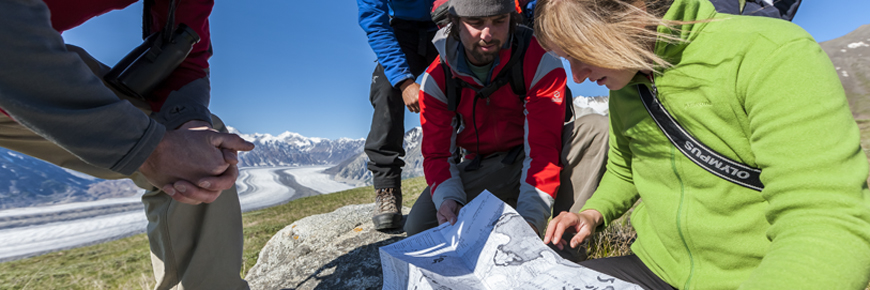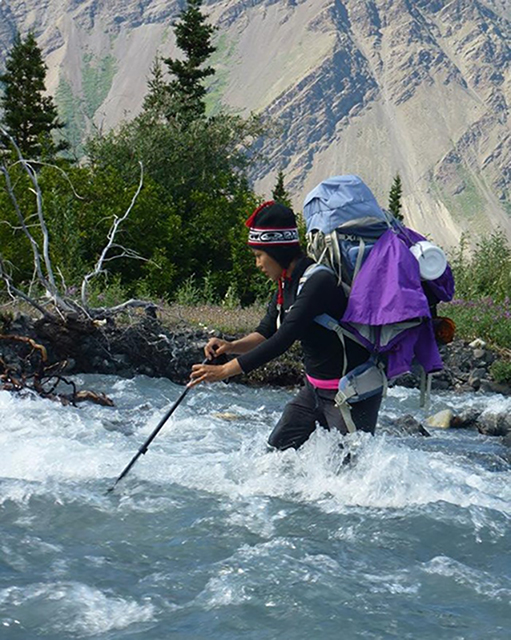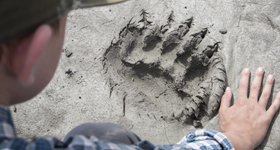
Backcountry safety
Kluane National Park and Reserve
Kluane National Park and Reserve is a remote wilderness park. Travellers must be entirely self-sufficient and able to handle any emergency situations on their own. Plan ahead. Select a trip which suits your party and ensure that you are properly equipped for your trip.
Emergencies
You are encouraged to a carry satellite phone or satellite GPS messenger device, such as a SPOT® or inReach® as cell phones are out of range in most areas of the park. In the event of an emergency, you should be prepared for lengthy delays in search and rescue response times due to weather conditions and/or the availability of both aircraft and rescue personnel.
Parks Canada 24 hour emergency dispatch
1-780-852-3100
Weather

Mountain weather is highly unpredictable. It can change quickly and/or vary greatly from one location to another. At higher elevations the temperature is generally colder and the weather is more unpredictable. Rain or snow can fall at any time of the year and freezing temperatures are possible even during the summer. The best way to deal with the weather is to prepare for all conditions.
Check the weather forecast:
Hypothermia
The risk of hypothermia is significant to outdoor recreationists. Hypothermia occurs when your core body temperature drops below a level that your vital organs can function at. It is caused by exposure to cold and is aggravated by wetness, wind and exhaustion. Most cases develop in fairly mild air temperatures between -1° C (30° F) and 10°C (50° F).
Prevention is the best cure:
- Wear appropriate clothing: layers that provide warmth even when wet, and warm hat and gloves
- Eat! The body needs the energy from food to create warmth. Keep a supply of high-energy food accessible
- Travel at the speed of the slowest member of your party. Don't let anyone become exhausted, their ability to stay alert and orientated will decrease
- Take breaks, stay warm. Make camp before fatigue sets in
- Take the weather into consideration! Assess changing conditions and adjust your plans accordingly
- Be alert to the first signs of hypothermia and act immediately if you start to shiver and feel numb, if you have difficulty speaking and if your muscle coordination becomes difficult.
Creek crossing
Creek crossings occur on most trails and routes in the park. Water levels will change throughout the summer and even over the course of the day. If a creek crossing appears to be very difficult and risky, turn back. There are many techniques for crossing creeks in a group. You should ensure you are well versed in creek-crossing techniques before you leave. You can discuss these with the Visitor Centre staff. Some suggestions:

- Try to cross streams early in the day when water levels are often lowest
- Always undo the waist strap of your pack for easy removal in case you fall
- Cross at the widest, shallow point that is below rapids or hazards such as trees in the water
- Don't cross barefoot; use boots or running shoes
- Face upstream while crossing
- Use a sturdy stick or trekking poles: position the stick upstream as it will provide more support
- Cross in a group for greater stability by holding on to fellow hiker's shoulders or backpack straps
Water quality concerns
Unfortunately, cases of Giardia or Beaver Fever have been reported in Kluane National Park & Reserve. To avoid contracting biological and chemical diseases you are advised to either:
- Fine filter (<0.5 microns)
- Treat (UV, iodine or chlorine in warm water)
- Boil your drinking water.
To prevent the spread of Giardia and other diseases you should bury feces in the top 15 cm (6") of soil and at least 30 m (100') above the high water mark of any water body.
Wildlife
Use caution around all wildlife and do not feed or approach them. Wildlife may become aggressive if they feel their food, young or space is being threatened.
Bears

Familiarize yourself with the principles and practices of safe travel in bear country. The You are in Bear Country brochure provides important information about traveling and camping in bear country.
- You are in Bear Country,or version in Deutsch (PDF, 1.13 Mb)
Parks Canada recommends carrying bear spray with you at all times on the trail. Bear resistant food canisters are required for overnight trips in most areas of the park from April 1 to November 15.
Animal carcasses
Animal carcasses are occasionally encountered in the park. If you encounter one, note the location, leave the area immediately, and report it to park staff.
- Date modified :